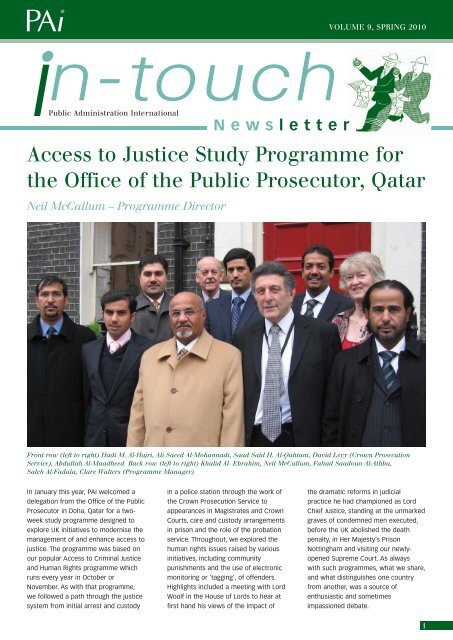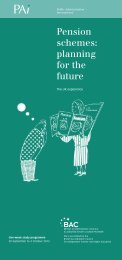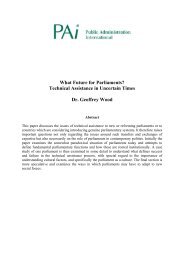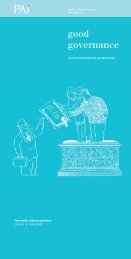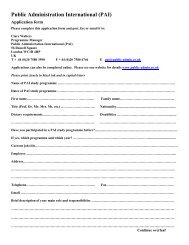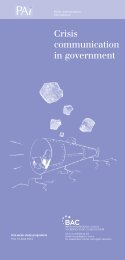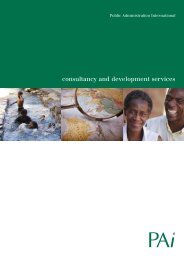Read PAI intouch newsletter Spring 2010 - Public Administration ...
Read PAI intouch newsletter Spring 2010 - Public Administration ...
Read PAI intouch newsletter Spring 2010 - Public Administration ...
You also want an ePaper? Increase the reach of your titles
YUMPU automatically turns print PDFs into web optimized ePapers that Google loves.
VOLUME 9, SPRING <strong>2010</strong>n-touchNewsletter<strong>Public</strong> <strong>Administration</strong> InternationalAccess to Justice Study Programme forthe Office of the <strong>Public</strong> Prosecutor, QatarNeil McCallum – Programme DirectorFront row (left to right) Hadi M. Al-Hajri, Ali Saeed Al-Mohannadi, Saad Said H. Al-Qahtani, David Levy (Crown ProsecutionService), Abdullah Al-Maadheed Back row (left to right) Khalid Al- Ebrahim, Neil McCallum, Fahad Saadoun Al-Athba,Saleh Al-Fadala, Clare Walters (Programme Manager)In January this year, <strong>PAI</strong> welcomed adelegation from the Office of the <strong>Public</strong>Prosecutor in Doha, Qatar for a twoweekstudy programme designed toexplore UK initiatives to modernise themanagement of and enhance access tojustice. The programme was based onour popular Access to Criminal Justiceand Human Rights programme whichruns every year in October orNovember. As with that programme,we followed a path through the justicesystem from initial arrest and custodyin a police station through the work ofthe Crown Prosecution Service toappearances in Magistrates and CrownCourts, care and custody arrangementsin prison and the role of the probationservice. Throughout, we explored thehuman rights issues raised by variousinitiatives, including communitypunishments and the use of electronicmonitoring or ‘tagging’, of offenders.Highlights included a meeting with LordWoolf in the House of Lords to hear atfirst hand his views of the impact ofthe dramatic reforms in judicialpractice he had championed as LordChief Justice, standing at the unmarkedgraves of condemned men executed,before the UK abolished the deathpenalty, in Her Majesty’s PrisonNottingham and visiting our newlyopenedSupreme Court. As alwayswith such programmes, what we share,and what distinguishes one countryfrom another, was a source ofenthusiastic and sometimesimpassioned debate.1
<strong>Public</strong> <strong>Administration</strong>InternationalEvaluating EC Support to <strong>Public</strong><strong>Administration</strong> in YemenAlexis Turrall – International Projects Manager<strong>PAI</strong>, in a consortium led by B&S Europe,was awarded an EC-funded contract to‘evaluate the EC’s outgoing andidentification of incoming support to<strong>Public</strong> <strong>Administration</strong> Modernisation’ inYemen. This was our first project inYemen and partially came out of ascoping visit there earlier in 2009. Theassignment stretched over two and ahalf months from November 2009 toFebruary <strong>2010</strong> and was implementedby three consultants, led by GiovanniMorsiani. The project aimed atidentifying the best possible way for theEC to support public administrationmodernisation in Yemen by conductingan evaluation of ongoing EC support;assessing possibilities for innovativeapproaches; and makingrecommendations on future support.The team arrived at tworecommendations. Firstly, to supportthe Ministry of Social Affairs and Labourby reviewing the structure and strategyof the Ministry; revising social andlabour policies; and buildinginstitutional capacity. The secondrecommendation is to design andsupport a decentralisation programme,the details of which will be decidedlater in the year. As a result of theserecommendations, it is hoped that theEC will commission two long-termprojects in these areas starting fromMay <strong>2010</strong>.Reviewing ProjectPerformance inRwandaDavid Watson – Team Leader<strong>PAI</strong> was asked in November 2009 bythe Ministry of Education in Rwanda toconduct a comprehensive PerformanceEvaluation Review of its World BanksupportedHuman ResourceDevelopment Project (HRDP) 2001-2009.This was to assist the Ministry’scompilation of its ImplementationCompletion Report on the project,which ended in December 2009. <strong>PAI</strong>provided a six-person international /Rwandan team.This ambitious project was designedwith full participation of Rwandanstakeholders and took into accountlessons learned from the first Bank/GoReducation sector project (1990-1999)which had coincided with the genocideand subsequent civil unrest of 1994.This catastrophic period was the backdropto an important element of theHRDP: a nation-wideprogramme ofcommunity-basededucationinfrastructureprojects aimed atrehabilitatingcommunities andforging socialcohesion.School children in RwandaBy the end of the project, over 1,000buildings were erected in 125 sites inall regions. Major strides were alsomade in the provision of textbooks andprofessional development for teachertraining, curriculum development,educational testing and incorporation ofscience and technology into thecurriculum. Education sector policy andperformance has been transformed inthe project period and dramaticimprovements achieved in participationrates and gender-balance.The project evaluation review had avery tight timetable but all teammembers rose to the challenge and thetwo volumes of analysis andinformation – including the lessons forthe Government, Ministry and the WorldBank emerging from the experience –were duly submitted by the deadline tothe satisfaction of the ProjectManagement Office.2
<strong>Public</strong> <strong>Administration</strong>InternationalKosovo: Two Years Since IndependenceFilloreta Bytyci – <strong>PAI</strong> Project Consultant, KosovoOn 17 February <strong>2010</strong>, Kosovocelebrated its second anniversary ofIndependence. This is a relatively shortperiod of time in the sense of statebuilding; but the developments of thelast decade and the two years sinceindependence have been of utmostimportance for the Kosovar people.Over the past two years, Kosovo hasenacted its Constitution; wasrecognised as an independent state by65 countries; established the requiredconstitutional and democraticinstitutions; approved over 160 laws;held its first local elections afterindependence; became a member ofthe World Bank and InternationalMonetary Fund and made considerableinvestments in its infrastructure. TheKosovar economy has shownencouraging growth recently, but it stillremains at an early stage ofdevelopment. However, poverty andunemployment plague developmentand continue to be the main challengesfor the years to come.Kosovo has the youngest population inEurope. Over fifty percent of itspopulation are under twenty-five yearsold. Being surrounded by young, brightpeople in every city or village of Kosovomakes one feel very proud. Amongthose young people there is a boycalled Tonibler Dajaku, a girl calledMadeleine, and a boy called KlintonKrasniqi. These are babies born shortlyafter the war and their parents creditCelebrations on the declaration of Independence, showing people writing theirnames on the ‘newborn’ statue.the work of Mr Blair, Ms Albright and MrClinton as their saviours by namingtheir babies after them.Because of the difficulties of the past,our society has lacked experience ofrunning state institutions. Furthermore,work under the supervision of theinternational actors such as UNMIKmeant that coordination, cooperationand the fulfilment of internationalobligations was not always an easytask. Nevertheless, the optimism for abrighter future and dedicated work hasovercome most of the difficulties. TheKosovar institutions managed to takeover responsibility for the state-buildingprocess and, jointly with the people andthe unsparing help of our internationalfriends, has succeeded in establishing agood basis for the development of ademocratic society based oninternational standards. Our efforts arenow directed towards furtherstrengthening and improving thefunctions of the state institutions, alongwith moving towards EU integration inorder to meet citizens’ needs andexpectations.<strong>PAI</strong> has been involved in DFID-fundedprojects to support the Governmentthrough this transition phase for overseven years and continues to advise onpolicy, strategic planning, legislation andrestructuring in the Office of the PrimeMinister, as well as on other capacitybuildingprojects in Kosovo.<strong>PAI</strong> Accredited by the BritishAccreditation CouncilWe are delighted to announce thatafter a comprehensive review andinspection of all aspects of our studyprogrammes, including their design,content and delivery, our premises,administrative policies andprocedures, we were accredited bythe British Accreditation Council forFurther and Higher Education inDecember 2009.BAC accreditation of our study programmeswill be of help to those visitorsto the UK who need to apply for ‘studentvisitor’ visas following the introductionof new visa arrangements in 2009.3
<strong>Public</strong> <strong>Administration</strong>InternationalDe-Mystifying Consultancyin GhanaMikeFogden CBSlava Gromlyuk – Business Development ManagerIn October 2009, I went to Ghanafollowing an invitation from theGhanaian Institute of Consulting todeliver training to a group ofgovernment officials on a three-dayprogramme entitled “De-Mystifying thePractice of Consultancy and ObtainingMaximum Results from ConsultancyServices Provision”. This programmewas designed to teach essentialconsulting skills to executives andsenior officials within public sectororganisations which use consultantsand other service providers. Theprogramme was attended by a group ofsenior officials from a range oforganisations including the GhanaBroadcasting Corporation, NationalHealth Insurance Authority, SocialSecurity and National Insurance Trust,Department of Urban Roads and others.Course participants in AccraMy presentations covered severalaspects of consultancy work such asscoping and developing the proposal,costing and pricing in competitiveconditions, managing the client’sexpectations and the quality assurancetoolkit. Throughout the programme, theparticipants shared their ownexperience of working with externalconsultants and learnt about when andhow best to use and manageconsultants. This visit was an excellentopportunity for me to practise mytraining skills as well as to shareinformation about <strong>PAI</strong> consultancy andtraining services. It also helped us todevelop institutional links with theGhanaian Institute of Consulting, which,we hope, will lead to furthercollaboration in consultancy in thefuture.We are very sad to have to report thedeath, on 10 October 2009, of MikeFogden, a member of <strong>PAI</strong>’s AdvisoryGroup and a close friend of <strong>PAI</strong>. For thewhole of his working life Mike had atotal commitment to public service anda huge interest in policy issues andpublic welfare. He had a distinguishedcareer in the civil service, culminating inalmost ten years as Chief Executive ofthe Employment Service. During hisretirement he held a number ofimportant public positions includingchair of the National Blood Authority,deputy chair of the Civil Service AppealsBoard, chair of the then AccountantsInvestigation and Discipline Board, andchair of the executive committee of the<strong>Public</strong> Management and PolicyAssociation. Given the wide range of hiswork we regarded ourselves as veryfortunate that he was able also todevote time to <strong>PAI</strong>. Mike had been amember of our Advisory Group since1997, was Programme Director for our<strong>Public</strong> Service Commissions studyprogramme, and was a frequentcontributor to our work. He showedhumour and humanity in abundance,was robust and straight-talking, hatedmanagement jargon and could alwaysbe counted upon to enliven ourmeetings. We will miss him a great deal.4We are keen to receive any feedback, comments, news or stories for the <strong>PAI</strong> <strong>newsletter</strong>. If you feel you can make a contributionplease write to Alexis Turrall, 10 Bayley Street, London WC1B 3HB, United Kingdom or T +44 (0)20 7580 3590F +44 (0)20 7580 4746 alexis.turrall@public-admin.co.uk; www.public-admin.co.uk We look forward to hearing from you.


